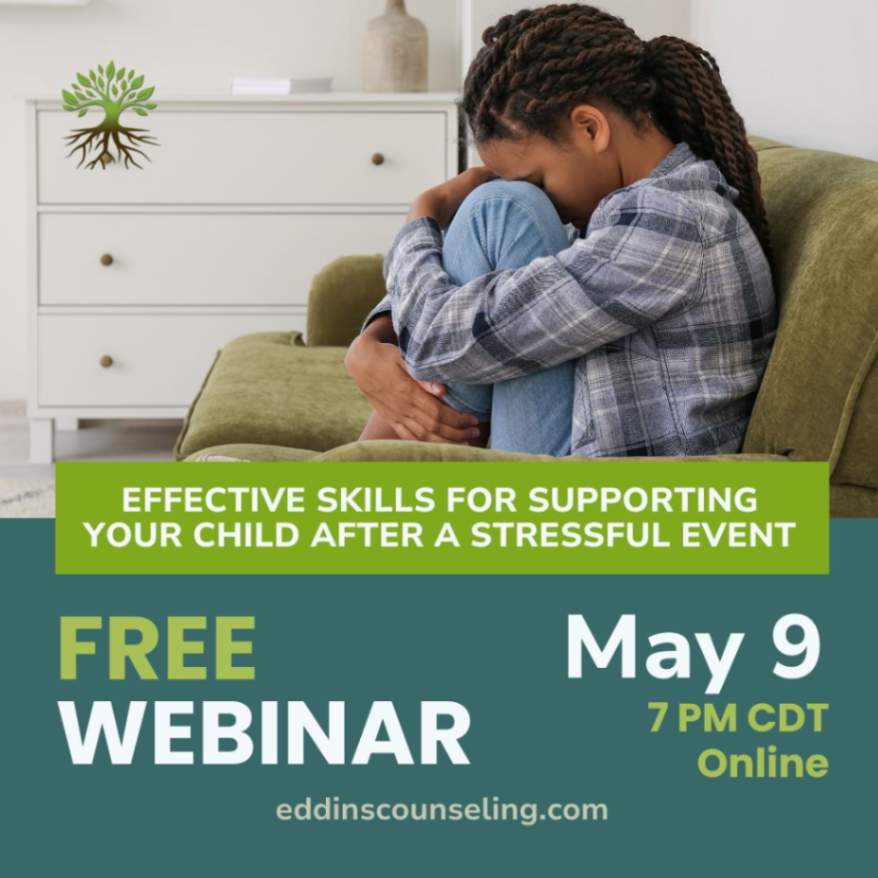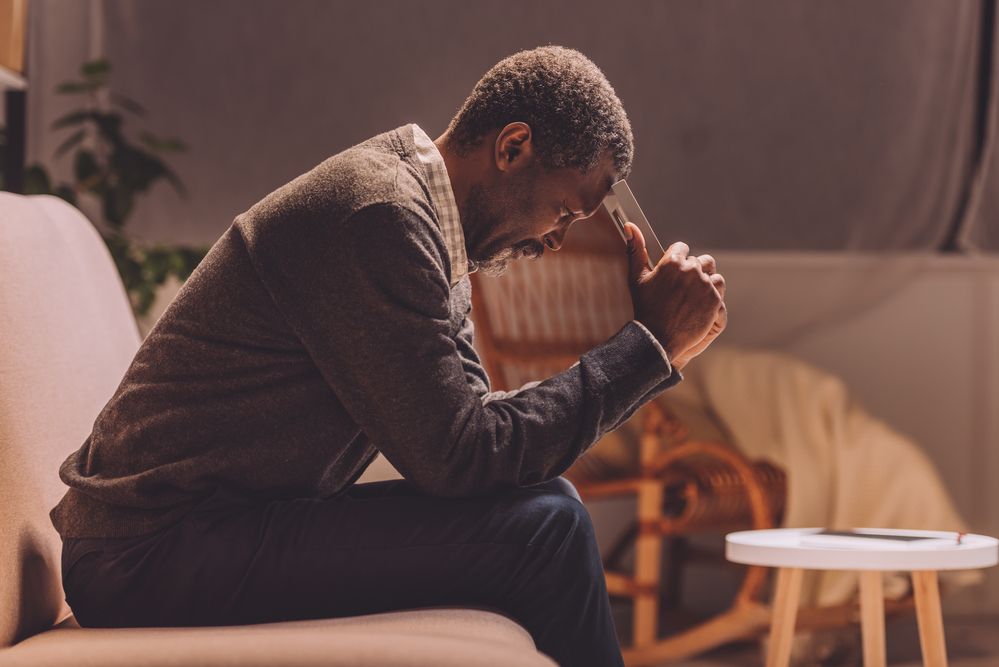May 15, 2023
The Importance of Mental Health Care for the Elderly in Hospice
Written by Guest Author
Posted in Emotional & Mental Health and with tags: grief and loss, mental health, mental health challenges

As the world’s population continues to age, it is increasingly essential to focus on the mental health and well-being of elderly individuals, particularly those in hospice care. Hospice care aims to provide comfort and support to patients during their final stages of life.
Mental health care is an often overlooked yet critical component of this care, as it can significantly improve a patient’s overall quality of life.
In this article, we will explore the importance of mental health care for elderly patients in hospice. We’ll also discuss how it can enhance their well-being, and provide practical tips for supporting their mental health.
Defining Hospice Care and Its Differences From Traditional Medical Care
Hospice care is a specialized form of medical care that focuses on providing comfort, pain relief, and emotional support for patients with terminal illnesses.
Unlike traditional medical care, which aims to cure or manage illnesses, hospice care prioritizes the patient’s overall quality of life during their remaining days.
Hospice care also extends support to family members, helping them cope with the emotional challenges associated with their loved one’s end-of-life journey.
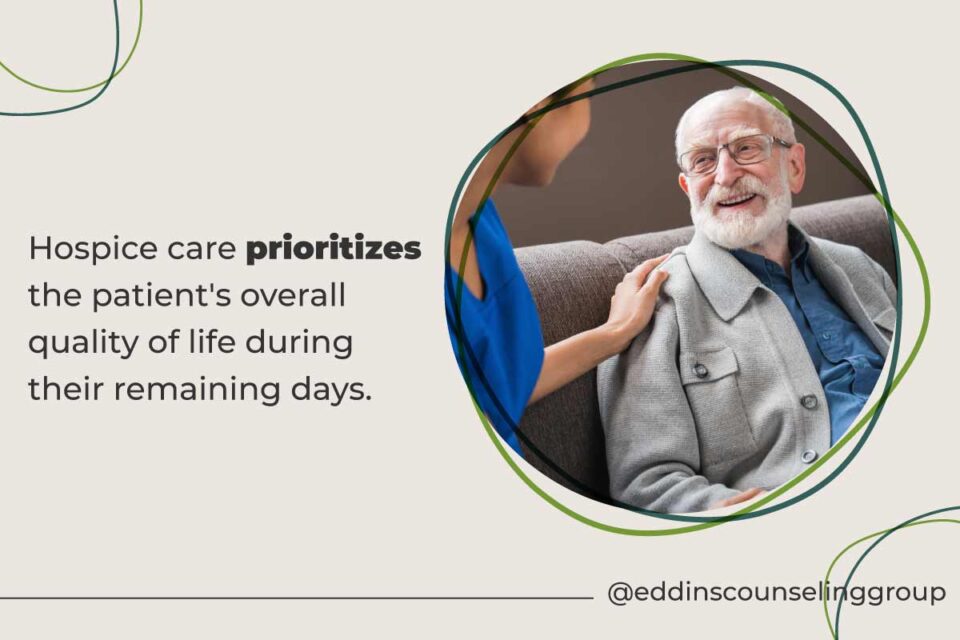
Unique Challenges Faced by Elderly Patients in Hospice and Their Impact on Mental Health
Elderly patients in hospice care face unique challenges that can impact their mental health. These challenges may include chronic pain, loss of independence, fear of death, grief, and feelings of isolation.
These factors can contribute to the development of mental health conditions, which can further compromise the patient’s overall quality of life.
Chronic Pain
Chronic pain is a common issue faced by elderly patients in hospice care, often resulting from their underlying medical conditions.
This constant discomfort can significantly impact their mental health, leading to:
- feelings of hopelessness,
- irritability, and
- depression.
Furthermore, chronic pain can disrupt sleep and exacerbate feelings of fatigue, further compounding the patient’s emotional distress.
Loss of Independence
As patients transition into hospice care, they often experience a decline in their physical abilities, leading to a loss of independence. This decline can manifest in various ways, such as reduced mobility, difficulty with self-care, and reliance on caregivers for assistance.
The loss of independence can result in feelings of frustration, sadness, and low self-esteem, which can negatively impact the patient’s mental health.
Fear of Death
The fear of death is a natural concern for elderly patients in hospice care, as they face the reality of their limited time left. This fear can lead to:
- heightened anxiety,
- existential distress, and
- feelings of helplessness.
Additionally, the patient may worry about the impact of their death on their loved ones, further increasing their emotional burden.
Grief
Elderly patients in hospice care often experience grief, not only for the impending loss of their own life but also for the lives of friends and family members who have passed away.
Grief is a complex emotional process that can manifest in various ways, such as sadness, anger, and denial. Unresolved or complicated grief can contribute to the development of:
- depression,
- anxiety, and
- other mental health challenges.
Feelings of Isolation
Social isolation is another common issue faced by elderly patients in hospice care. Due to factors such as reduced mobility, limited social opportunities, and the loss of friends or family members, these patients may experience feelings of loneliness and isolation.
Prolonged isolation can lead to depression, increased feelings of helplessness, and reduced overall quality of life.
By addressing these unique challenges and providing appropriate mental health care interventions, we can support the well-being of elderly patients in hospice care and improve their overall quality of life.
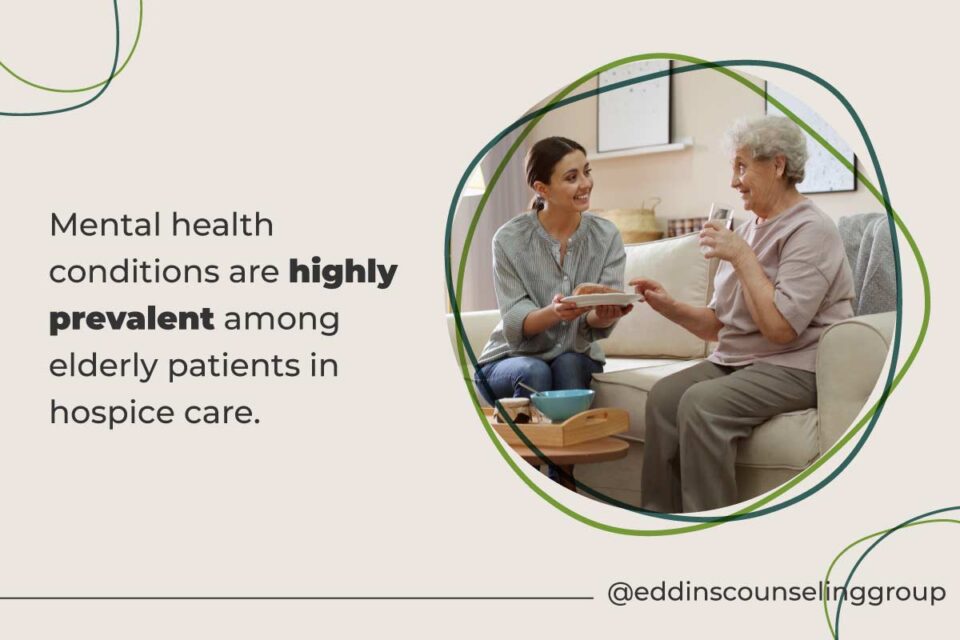
Prevalence of Mental Health Conditions in Elderly Patients Receiving Hospice Care
Research indicates that mental health conditions are highly prevalent among elderly patients in hospice care.
- Depression, for instance, is a common issue, with studies showing that up to 25% of hospice patients may experience depressive symptoms.
- Anxiety is also frequently reported, with one study estimating that around 16% of patients with advanced cancer experience anxiety and depression.
In addition to depression and anxiety, elderly patients in hospice care may experience a variety of mental health conditions. Some of these conditions include:
Adjustment Disorder
This condition can develop in response to significant life changes or stressors, such as transitioning into hospice care or dealing with a serious illness. Symptoms can include feelings of:
- sadness,
- hopelessness,
- irritability, or
- difficulty concentrating.
Post-traumatic Stress Disorder (PTSD)
Elderly patients with a history of trauma, such as veterans or survivors of abuse, may experience PTSD symptoms, including intrusive thoughts, nightmares, emotional numbing, or hyperarousal.
Delirium
Delirium is an acute and fluctuating disturbance of consciousness, attention, and cognition that can occur in patients with serious medical conditions, such as advanced cancer or organ failure. Delirium can cause confusion, agitation, hallucinations, or changes in mood and behavior.
Insomnia
Sleep disturbances, including difficulty falling asleep, staying asleep, or poor sleep quality, can negatively impact mental health and exacerbate existing mental health conditions.
Grief and Loss
Patients in hospice care often experience grief and loss, both for their own impending death and the deaths of friends or loved ones. Unresolved or complicated grief can contribute to the development of mental health challenges.
Dementia
Some elderly patients in hospice care may have pre-existing dementia or cognitive decline, which can cause difficulties in communication, memory, and decision-making, as well as behavioral and emotional disturbances.
Existential Distress
Patients in hospice care may struggle with existential issues, such as finding meaning and purpose in their lives, reconciling with their mortality, or grappling with spiritual or religious beliefs.
This distress can contribute to feelings of depression, anxiety, or hopelessness.
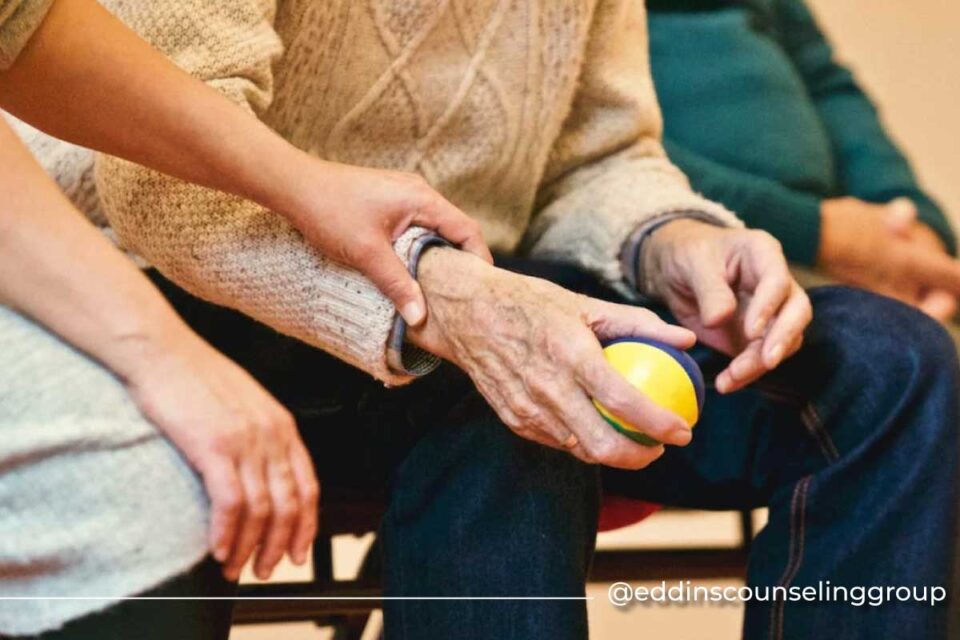
Benefits of Mental Health Care for Elderly Patients in Hospice
Addressing the mental health needs of elderly patients in hospice care can lead to numerous benefits. Here’s a list of some common benefits patients experience:
Improved Emotional Well-being
One of the primary benefits of mental health care for elderly patients in hospice is the improvement in their emotional well-being.
By addressing their mental health needs, patients may experience a reduction in feelings of sadness, anxiety, and fear, leading to an overall enhancement in their mood and outlook.
Enhanced Resilience
Mental health care can provide patients with the tools and strategies to better cope with the challenges they face during their end-of-life journey.
By learning effective coping skills, patients can build resilience and navigate the physical, emotional, and spiritual aspects of their hospice experience with greater ease.
Reduced Symptom Burden
By addressing mental health issues, such as depression and anxiety, patients may experience a reduction in their overall symptom burden.
This can lead to improvements in physical symptoms, such as pain, fatigue, and sleep disturbances, which can contribute to a better quality of life.
Increased Sense of Meaning and Purpose
Mental health care interventions can help patients explore their values, beliefs, and life experiences, allowing them to find a sense of meaning and purpose in their final stages of life.
This can lead to a greater sense of fulfillment and peace during their hospice experience.
Strengthened Relationships with Family and Friends
Providing mental health care for elderly patients in hospice can also benefit their relationships with family and friends.
Open communication, emotional support, and the processing of feelings can help patients and their loved ones navigate the challenges of the end-of-life experience together, fostering deeper connections and understanding.
Support for Grieving Families
Support for mourning families can be provided as part of mental health treatment interventions. Mental health care can help families navigate the grief process and begin healing by offering bereavement counseling, support groups, and resources.
Mental Health Care Programs and Interventions in Hospice Settings
There are various mental health care programs and interventions that have proven successful in hospice settings. Some of these include:
- Cognitive-behavioral therapy (CBT) for depression and anxiety
- Mindfulness-based stress reduction (MBSR) to promote relaxation and alleviate anxiety
- Grief counseling and support groups for patients and their families
- Art and music therapy to enhance emotional expression and overall well-being
- Spiritual care to address existential concerns and support patients’ spiritual needs

Tips for Supporting the Mental Health of Elderly Patients in Hospice
To support the mental health of elderly patients in hospice care, consider the following tips:
Effective Communication and Active Listening
Establishing open communication and practicing active listening are crucial in validating the patient’s feelings and concerns.
Create a safe space for patients to express their thoughts and feelings without fear of judgment or criticism. Remember that words matter, so when you’re talking to someone in hospice, choose what you say carefully and empathetically.
Providing Emotional Support and Encouragement
Offering emotional support is essential for elderly patients in hospice care. Encourage them to share their emotions, fears, and concerns, and provide a non-judgmental presence.
Offer reassurance and comfort, and remind them that they are not alone during this challenging time.
Engaging in Meaningful Activities and Social Interaction
Help patients engage in activities that they enjoy and find meaningful, such as listening to music, reading, or creating art.
Encourage them to maintain social connections with friends and family, as this can help reduce feelings of isolation and loneliness.
Facilitate social opportunities within the hospice setting, such as support groups or social events, to foster a sense of community and belonging.
Collaborating with the Hospice Care Team
Work closely with the hospice care team to ensure the patient’s physical comfort and pain management needs are adequately addressed, as uncontrolled pain can contribute to poor mental health.
Coordinate with mental health professionals, such as therapists and counselors, to develop a comprehensive care plan tailored to the patient’s unique mental health needs.
Promoting Spiritual Care and Exploration
Encourage patients to explore their spiritual beliefs and values, and address any existential concerns they may have.
Provide access to spiritual care resources, such as chaplains or spiritual counselors, to support patients in finding meaning, purpose, and comfort during their final stages of life.
How Mental Health Therapists Help Improve Mental Health for Elderly Patients in Hospice
Mental health therapists play a crucial role in supporting the mental well-being of elderly patients in hospice care. Several ways mental health therapists can help hospice patients include:
Providing Tailored Therapeutic Interventions
Mental health therapists can offer various therapeutic interventions tailored to the unique needs of elderly patients in hospice care.
These may include cognitive-behavioral therapy, mindfulness-based interventions, or grief counseling, all of which can help patients navigate the complex emotional landscape of end-of-life care.
Improving Hospice Care Services
Mental health therapists can work closely with the hospice care team, guiding them on how to manage the patient’s mental health symptoms. This ensures that the patient receives comprehensive care that addresses both their physical and emotional needs.
Educating Patients and Families
Therapists play a critical role in educating patients and families about mental health issues. By providing information and resources, therapists can help patients and families better understand and manage mental health challenges.
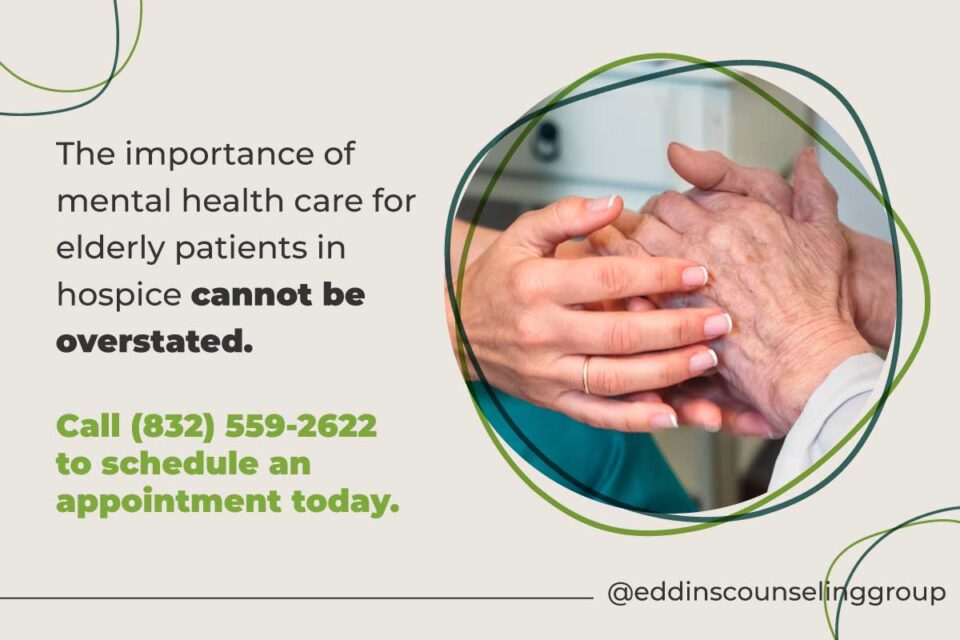
Final Thoughts
The importance of mental health care for elderly patients in hospice cannot be overstated.
Addressing the mental health needs of these patients can lead to numerous benefits, including improved emotional well-being, reduced symptom burden, and enhanced overall quality of life.
By providing mental health support and interventions tailored to the unique challenges faced by elderly patients in hospice care, we can help ensure a more dignified, comfortable, and meaningful end-of-life experience for them and their families. To get started, call us – your local Houston therapists and Sugar Land therapists – at (832) 559-2622.
Grounding & Self Soothing
Get instant access to your free ebook.
Why You Feel This Way
Get instant access to your free ebook.






